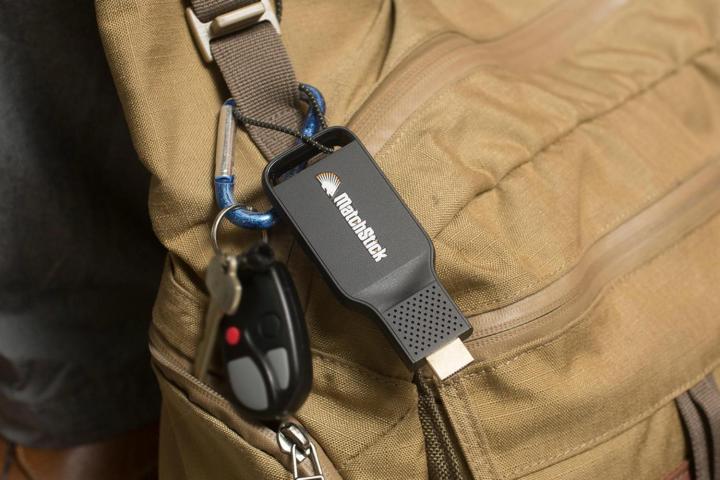
Matchstick, a small Wi-Fi-connected HDMI stick that plugs into your TV, is the first streaming stick built for and officially certified by Mozilla. The eponymous startup behind the device describes itself as stemming from “a group of coders, gadgeteers, and entrepreneurs that spent way too much time mired in the guts of platforms such as B2G, XBMC, and Boxee.”
Today, Matchstick’s creators launched a lightning-hot Kickstarter campaign aimed at gathering $100,000 for the project by October 30. As of publication, the device has already edged above 60 percent of its funding goal, garnering over 2,600 backers at the dawn of the campaign.
But this isn’t the first we’ve heard about the mysterious Firefox-powered device.
Back in late June, Mozilla developer Christian Heilmann tweeted a picture of what he called “a fully open TV casting prototype device running #FirefoxOS” with an “open boot loader and all.” The tweet spurred on a fit of speculation that Mozilla itself was developing a media-streaming stick to compete with the Chromecast, but a Mozilla representative quickly shot down the rumors by asserting that the stick was “not a Mozilla project, and we do not make devices.” The mystery continued to drive speculation, until very recently. And today’s quick glance at the new device should make cord-cutters very excited.
At roll-out, the Matchstick team plans to deliver a core set of apps for the device, with Netflix, HBO Go, and Pandora already aboard, similar to the early days of the Chromecast before Google opened up the SDK kit and let the dongle fly. As its developer community grows, the company claims the Matchstick will quickly garner new apps and functionalities. Taking Firefox’s open source format to heart, the company claims it has removed “any barriers to development and manufacturing” by making the reference designs and hardware schematics available for download.
To get the Matchstick’s hardware specs to rise above those found in other streaming sticks, the developers integrated a powerful dual-core Rockchip 3066 processor, added 4GB of onboard storage, and dropped in 1GB of DDR3 memory. According to Matchstick, “the bigger processor and increased memory gives you a much better video playback cache and increased performance for whatever games and custom overlays you might dream up.” And that’s really the crux of the Matchstick: it’s a completely open hardware and software platform, which translates to lower production costs, smaller installs, and more personalized apps, all without the need for app approval or oversight.
In order to make its dongle robust and more diverse than competing devices, the Matchstick’s creators have invited app developers who will commit to building and porting apps for Firefox OS to apply for a free developer-preview device. The program is aimed at developers who have built apps for Firefox OS, Chrome, Android, iOS, and even Chromecast. The dongle is already binary-compatible with a large number of existing Chromecast apps, making it much easier and less time-consuming for developers to port their Chromecast-specific creations to Matchstick via a simple recompile process.
The first 500 $12 early bird offerings of the device are already gone, but as of publication there are still Matchsticks available for just $18. And even if you fail to secure a pre-order of a Matchstick via the Kickstarter campaign, the company is already indicating a very low retail price of just $25 upon release. Though it is hoping to have the Matchstick available to the general public “before the holidays,” the company has said that it may have to wait until the first few months of 2015 to begin shipping.
Now, three months after our first glance at the Matchstick, we know enough to take this fledgling device a lot more seriously as it makes its way towards Kickstarter success, and into the hands of hungry developers. However, it still has a long way to go, and a lot of competition to contend with once it gets there. With Amazon, Apple, Google, and Roku all in the hunt, Matchstick will have to deliver on its promise to create a new level of creativity in the dongle world. We’ll keep an eye on the Matchstick as the campaign progresses, and will update this story with any important developments.


